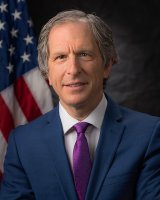About the Administrator of EPA's New England Region (Region 1)
David Cash

David W. Cash has spent his career in public service harnessing science, innovative policy and participatory decision-making to solve challenges and seize opportunities at the intersection of environment, economy and equity.
Prior to coming to EPA, Dr. Cash was the Dean of the John W. McCormack Graduate School of Policy and Global Studies at the University of Massachusetts Boston.
Dr. Cash also spent a decade in Massachusetts state government where he held a range of senior positions, working to transform the Commonwealth's environmental and energy policy. As Assistant Secretary of Policy in the Executive Office of Energy and Environmental Affairs in Governor Deval Patrick's Administration, he was an architect of a range of nation-leading climate, clean energy and environmental justice policies. All of these initiatives were grounded in the notion that wise environmental policy, economic policy and policies for equity can and should go hand-in-hand. He then served as a Commissioner in the Department of Public Utilities, followed by serving as the Commissioner of the Department of Environmental Protection. With this experience of being both an environment and an energy commissioner, he had the unique perspective of understanding the importance of breaking down silos and focusing on complex issues in much more comprehensive and integrative ways.
In all of these senior roles in state government, he collaborated across government and with communities and the private sector to craft and implement innovative science-based policies around climate, environmental justice, energy, job creation, water, land use, waste management, and grid modernization.
Dr. Cash holds a Ph.D. in public policy from the John F. Kennedy School of Government at Harvard University, a science teaching degree from Lewis & Clark in Portland, OR, and a BS in biology from Yale.
He and his wife Annie Weiss, a psychotherapist, live in the Boston area and have two young adult daughters, who are both pursuing careers in addressing systemic climate injustice and ecosystem health.
